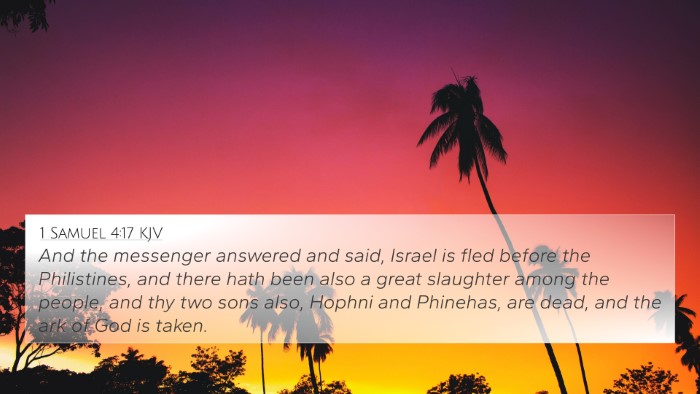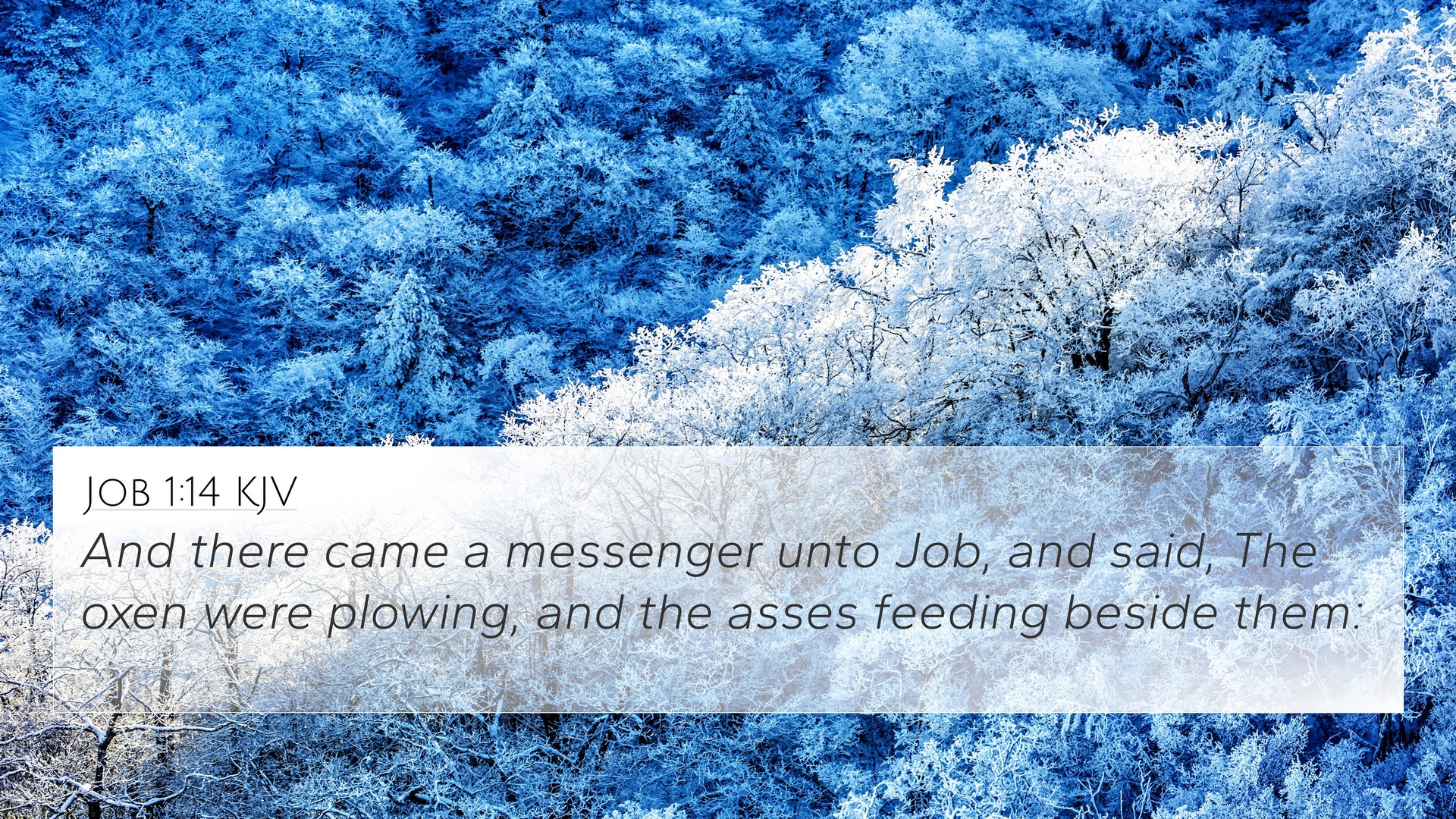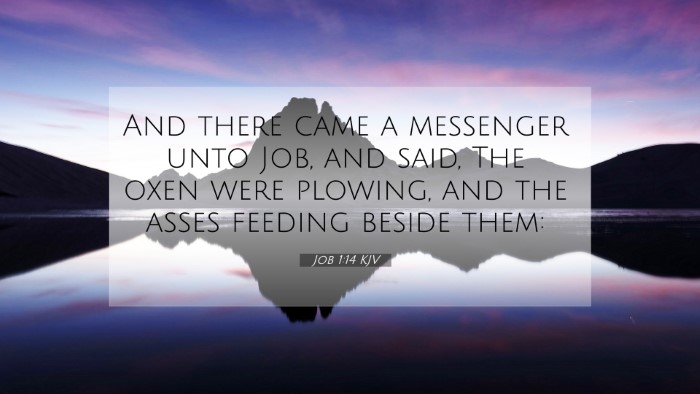Old Testament
Genesis Exodus Leviticus Numbers Deuteronomy Joshua Judges Ruth 1 Samuel 2 Samuel 1 Kings 2 Kings 1 Chronicles 2 Chronicles Ezra Nehemiah Esther Job Psalms Proverbs Ecclesiastes Song of Solomon Isaiah Jeremiah Lamentations Ezekiel Daniel Hosea Joel Amos Obadiah Jonah Micah Nahum Habakkuk Zephaniah Haggai Zechariah MalachiJob 1:14 Similar Verses
Job 1:14 Cross References
And there came a messenger unto Job, and said, The oxen were plowing, and the asses feeding beside them:
Uncover the Rich Themes and Topics of This Bible Verse
Listed below are the Bible themes associated with Job 1:14. We invite you to explore each theme to gain deeper insights into the Scriptures.
Job 1:14 Cross Reference Verses
This section features a detailed cross-reference designed to enrich your understanding of the Scriptures. Below, you will find carefully selected verses that echo the themes and teachings related to Job 1:14 KJV. Click on any image to explore detailed analyses of related Bible verses and uncover deeper theological insights.

1 Samuel 4:17 (KJV) »
And the messenger answered and said, Israel is fled before the Philistines, and there hath been also a great slaughter among the people, and thy two sons also, Hophni and Phinehas, are dead, and the ark of God is taken.

2 Samuel 15:13 (KJV) »
And there came a messenger to David, saying, The hearts of the men of Israel are after Absalom.

Jeremiah 51:31 (KJV) »
One post shall run to meet another, and one messenger to meet another, to shew the king of Babylon that his city is taken at one end,
Job 1:14 Verse Analysis and Similar Verses
Understanding Job 1:14
The verse Job 1:14 states: "And there came a messenger unto Job, and said, The oxen were plowing, and the asses feeding beside them." This verse marks a pivotal moment in the narrative of Job, setting the stage for the trials he is about to face. By examining the context and meanings drawn from various commentaries, we can glean deeper insights and connections with the broader biblical narrative.
Summary of Insights
This verse is significant for several reasons:
- Contextual Background: Job is depicted as a man of great wealth and piety, who regularly offers sacrifices to God for his family’s sins. The messenger's arrival signifies impending disaster and loss.
- Divine Sovereignty: The events that transpire next are attributed to divine permission, showcasing the nature of suffering and God's role in human affairs.
- Foreshadowing: The oxen and asses represent Job's wealth and livelihood. The attack on these assets foreshadows the profound losses to come.
Commentary Insights
This analysis draws from several public domain commentaries, including those by Matthew Henry, Albert Barnes, and Adam Clarke, offering comprehensive interpretations.
Matthew Henry's Commentary
Henry emphasizes the swiftness of the messenger's report, suggesting an overwhelming blow to Job's life, demonstrating how quickly misfortune can strike. He notes that the loss of livestock was not merely financial but also devastating to Job's way of life, signifying a rupture in his divine blessings.
Albert Barnes' Commentary
Barnes elaborates on the circumstances surrounding the messenger's arrival, highlighting the importance of contextualizing Job's suffering rather than viewing it in isolation. He points to the role of God's testing of faith through trials, suggesting that these losses serve greater divine purposes.
Adam Clarke's Commentary
Clarke discusses the implications of the oxen and asses’ loss in Job's societal context, as they were essential to agricultural life. He elucidates how this loss symbolized not just a material decline but a spiritual challenge, inviting readers to contemplate the reasons behind such afflictions.
Cross-References Related to Job 1:14
Job 1:14 presents opportunities for cross-referencing with several significant verses throughout the Bible. Below are 8 relevant verses that expand on themes of suffering, loss, and divine purpose:
- James 5:11: "Behold, we count them happy which endure." This verse speaks to perseverance through trials, aligning with Job's enduring faith.
- 1 Peter 5:10: "But the God of all grace, who hath called us unto his eternal glory by Christ Jesus, after that ye have suffered a while, make you perfect..." This provides assurance that suffering can lead to spiritual maturity.
- Romans 5:3-4: "And not only so, but we glory in tribulations also..." These verses extol the virtues of suffering, much like Job's experience.
- Psalm 34:19: "Many are the afflictions of the righteous: but the Lord delivereth him out of them all." This reflects God's compassion amid trials.
- Isaiah 48:10: "Behold, I have refined thee, but not with silver; I have chosen thee in the furnace of affliction." This directly connects to the theme of divine testing.
- Philippians 1:29: "For unto you it is given in the behalf of Christ, not only to believe on him, but also to suffer for his sake." This emphasizes suffering as part of the Christian experience.
- 2 Corinthians 4:17: "For our light affliction, which is but for a moment, worketh for us a far more exceeding and eternal weight of glory." This encourages viewers to see the transient nature of earthly suffering.
- Hebrews 12:6: "For whom the Lord loveth he chasteneth." This underlines that hardships can be a form of divine love and correction.
Thematic Connections and Comparative Analysis
The connections between Job 1:14 and these cross-references illustrate key themes such as the nature of suffering, faith under trial, and God's overarching sovereignty. A comparative Bible verse analysis can help draw out the nuances in these lessons:
- Trials as a Test of Faith: Just as James speaks to the endurance required, Job’s story emphasizes maintaining faith amid losses.
- Divine Providence: The threads connecting Romans and Isaiah highlight that suffering serves a purpose within God’s greater plan.
- Spiritual Growth: Both Philippians and 2 Corinthians emphasize that trials are opportunities for growth and strength in faith.
- God's Affection Through Affliction: References in Hebrews and Psalm reinforce the idea that hardship can lead to deeper spiritual connections to God.
Conclusion: Interpreting Job 1:14 within the Biblical Narrative
Job 1:14 is not an isolated verse but a significant piece within a larger narrative that addresses profound themes of suffering, divine sovereignty, and faith. By utilizing tools for Bible cross-referencing, such as a Bible concordance or a cross-reference Bible study guide, readers can uncover the rich tapestries of meanings woven throughout the scriptures. As we examine the connections between various Bible verses, we enhance our understanding and appreciation of God’s word.
In summary, the exploration of Job 1:14, in conjunction with relevant commentary insights and cross-references, provides a more profound understanding of the complexities involved in biblical themes of suffering and divine purpose. This interconnected study not only enriches personal faith but also equips believers for deeper theological inquiries.


